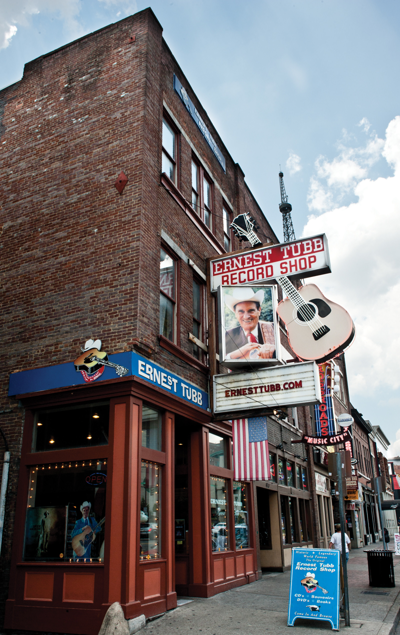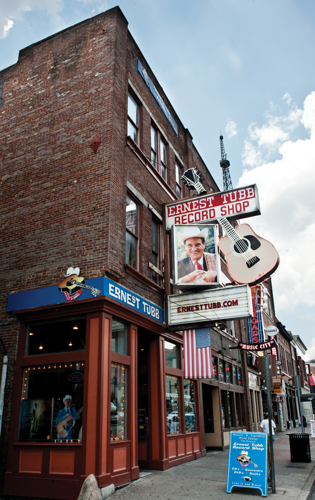For the past few weeks, blogs and Facebook pages catering to fans of traditional country music have been ablaze with rumors and reports about the imminent demise of the Ernest Tubb Midnite Jamboree radio show. While initial death reports may have been exaggerated, the 68-year-old Nashville broadcasting institution future is indeed in jeopardy. But help is on the way.
"It was a situation that nobody was aware of, and it took a catastrophe for things to get better," Ken Mosher, co-director of the recently established Midnite Jamboree Association tells the Scene.
That "catastrophe" was a March 27 announcement that Ernest Tubb Record Shop owner David McCormick suspended the weekly radio show, citing high operating costs. Established in 1947, just a few months after country music legend Ernest Tubb opened his first record shop in Nashville, the Midnite Jamboree became a beloved postscript to the Grand Ole Opry on Saturday nights and a favorite of country music night owls. Jamboree featured star attractions, showcased new talent and promoted the record shop's mail-order services. For decades it was an important stepping-stone for new artists seeking an eventual spot on the Opry.
Originally staged at the Ernest Tubb Record Shop's location on Commerce Street, Midnite Jamboree was an immediate success, and in 1951 the Record Shop moved to its present location on Broadway to accommodate larger crowds. In 1979, the show relocated to the Texas Troubadour Theatre, adjacent to the Ernest Tubb Record Shop's location on Music Valley Drive, near the Grand Ole Opry House.
"It's always been joined at the hip with the Ernest Tubb Record Shop," Mosher says. "The decline in the sales of CDs led to the record shop not being able to afford the expenses for the show."
That decline, particularly the decrease in mail-order sales, made the Jamboree a hefty expense with few returns. The financial problems are not new, even though the general public wasn't aware of it, says T. Clark Miller, president of Music Valley Merchants Association and the property manager of the Texas Troubadour Theater.
"Since April of 2014," Miller tells the Scene, "we've been allowing the Midnite Jamboree to be held in the Texas Troubadour Theater with no charge for the rent. We do charge for other events that are held in the theater, but we believe in the Jamboree for its historical significance and its importance to the Nashville country music scene."
According to Mosher, McCormick, who declined the Scene's request for comment through an intermediary, had been personally footing the weekly production costs of $2,200 to $2,500 for each show for months on end. Those costs include paying musicians, utilities and fees to WSM radio. When costs became unsustainable, McCormick reached out to Glen Douglas Tubb, songwriter and nephew of Ernest Tubb.
"Glen then approached me about putting together an association to help finance the Jamboree and put it back on its feet," Mosher recalls. And so the Midnite Jamboree Association was born. "[Jamboree] has always been a first-class operation and free to the public," Mosher continues. "We'd like to keep it that way." The show is currently on hiatus, but Mosher and his colleagues hope to have it back and running on a regular schedule by May.
"The association is barely a month old," Mosher notes, "but it is growing by leaps and bounds. People are coming out of the woodwork and asking what they can do to help. The first thing is for people to join the organization. All the membership dues will go strictly towards getting the Jamboree back on the air. We're also lining up some benefit concerts and have several stars committed. Entertainers who got their start there and haven't forgotten it have been coming up and saying, 'What can I do?' " Mosher says both WSM and the property landlords have been very accommodating and supportive of the efforts to save the classic show, a sentiment that T. Clark Miller echoes.
"All the businesses in that area are supportive of the Midnite Jamboree," Miller says. "We understand that times change and things evolve, but hopefully they can work it out and it will continue in Music Valley and near the Opry. It's an important institution no matter what type of country music you like, and it's important to keep that history alive."
"We want to stay true to the way Ernest Tubb founded it," Mosher says, "and keep it as an outlet for up-and-coming artists. I'm a traditionalist, and I hate to see icons like this going under. We don't know all the answers, but we're hoping some of our members will bring fresh ideas. If we can get just a thousand members, the Association will really be off and running."
Email arts@nashvillescene.com






